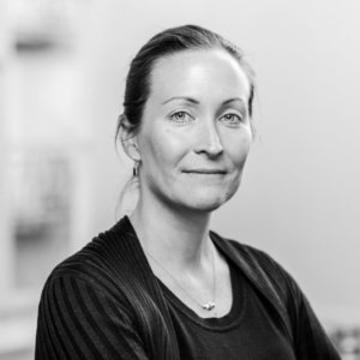Kate Thiers, co-founder of I-Drop Water Holdings

Kate Thiers is the co-founder of I-Drop Water Holdings, along with her husband James. I-Drop Water Holdings is an innovative social impact company in the African retail drinking water market, where purified bottled water is simply not affordable for millions of people and single-use plastic waste is creating a huge environmental problem.
Approximately five years ago, while living in Johannesburg, James and Kate developed the first prototype of the Waterpod, a drinking water refill station which is placed in grocery shops at no cost to shop owners. Using advanced purification technology, the Waterpod is centrally monitored to ensure the safety of its water. Not only does it help eliminate single-use plastic, it also offers an 80-90% discount on bottled water. While the Waterpod has been out on the South African market for four years, Kate and James have never stopped improving the design.
Where James’ skillset is innovation and the creation of ideas, Kate instead specializes in turning ideas into a successful business. She has worked as a consultant in Arthur Anderson and a project manager with Johnson and Johnson. She also worked as Chief Operations Officer and Interim CEO of the not-for-profit Africa Health Placements which opened her eyes to what kinds of social impact could be achieved. Although I-Drop Water Holdings, her first start-up, is a social impact business, it is also a for-profit organisation, focusing on sustainable business while increasing the reach of the drinking water market through affordable pricing and aligned incentives. Kate’s operational skillset enabled her to turn a theoretical idea into a revolutionary and working business model.

I’ve always known I wanted to go in business. During my BSE at The Wharton School, I took a lot of entrepreneurial classes and learned the basics of starting your own company. I also loved my year in Oxford as an MBA student because it gave me a global, international perspective I wouldn’t have had otherwise. In particular, the Skoll Centre for Social Entrepreneurship exposed me to opportunities for social enterprise. It also happened to be where I met James, my husband!
Since then I’ve worked in three countries and across multiple cities, largely in operationally-focused roles. When James was offered a job in Johannesburg we moved and, while at the time we said it would only be for two years, we’re still in South Africa eleven years later.
James and I balance each other well – he is brilliant at coming up with ideas, while I am interested in how to turn those ideas into reality. When James presented the Waterpod idea five years ago, the first thing I did was run the numbers. Not-for-profits rely on grants whereas for-profits need to have a sustainable businesses model – excitingly, the Waterpod was financially viable and we’ve been able to grow over the last five years. I’ve really enjoyed being able to start a company a little later in life because I can draw on all the skills I’ve developed over my career.
What is your definition of entrepreneurship?
Entrepreneurship is creating something out of nothing. I don’t just mean a product – as an entrepreneur, you take a theoretical idea and also create business models and processes which prove it can exist in real life.
How and when did you know your idea was good enough to develop it?
The Waterpod was purely theoretical at the start but after I analysed the business model, I knew it could work as a business. We went through a lot of prototypes and designs, doing a lot of market testing to make sure it worked. We also had to create new systems and processes that don’t exist in the South African drinking water market that would in other countries, like America. For instance, we now control our entire supply chain which allows us to monitor quality and lead times. Looking back, it was about two years in we had a stable product and platform, although we have never stopped trying to improve it further.
What would you say are the top 3 skills that needed to be a successful entrepreneur? Why?
First, determination, or grit as it’s often called now. I don’t know how you could do this without it. Second, adaptability. As an entrepreneur, you aren’t working in a big company where everything is fairly predictable. Each day throws a wrench into the works and you need to adapt to new situations very quickly. Third, being solutions driven. Things will always go wrong – instead of only focusing on the problems, entrepreneurs need to come up with solutions. Fixing things is your job as an entrepreneur.
What is your favourite part of being an entrepreneur?
Everything! I love being able to use all the talents I have and the skills I’ve learned to create something entirely new. Knowing that we have created an entire ecosystem that benefits thousands of people, providing cheaper access to purified water and greater opportunities for other entrepreneurs, is incredible. It really matters.
What individual, company or organization inspires you most? Why?
For me, the most inspiring person or company is one that acts with integrity all the time. Unfortunately, no specific company comes to mind straight away. If anything, we see so much ‘green-washing’ where companies claim they’re environmentally friendly while they haven’t substantially changed what they do.
On the other hand, a person that stands out is Barack Obama. Over the last four years his reputation and legacy has been under relentless attack, but he has always acted with integrity. As an entrepreneur, that really resonates with me. Even if you’re not under attack to this extent, you’re always dealing with something, an irate customer, a supplier who doesn’t deliver… However, you always need to respond with grace and integrity.
If you had 5 minutes with the above individual/ company/organization, what would you want to ask or discuss?
I’d ask how he does it! How does he mentally cope with that? How does he distance himself, put the noise aside and be confident in what he believes in? How does he keep his integrity and not sink to the level of those attacking him? It’s remarkable.
What has been your most satisfying or successful moment in business?
The standout moment I’ll always remember was getting to the final five of the global Chivas the Venture competition. At the finals in LA, I was sitting in an audience of celebrities, watching my husband pitch our business on stage while eating popcorn! It was an amazing experience. It’s hard to pin down our most ‘successful’ moment. Just the fact that we’ve got this far shows we’ve beaten the odds. Most start-ups don’t reach their sixth year, so knowing that we’re still here and still constantly innovating this idea that just didn’t exist before is what I remind myself of the most.
There have been so many challenges. In this world of entrepreneurship, no one is going to save you. When things get bleak you have to save yourself. I remember, at the start, we developed a single Waterpod prototype and drove for twelve hours across South Africa to install it in the one shop that would give us a chance. Of course, it broke within six hours of us driving home. It then broke again, the next week. We continued to fix and improve it, listening to our market and seeing how they interacted with it.
A business professor of mine at Oxford once told me – if you’re not embarrassed by your first prototype then you haven’t deployed it early enough. You have to constantly learn from customers and clients and even when you are confident it will work, you never stop improving.
I was also once given the good advice, ‘don’t run out of cash, because if you do everything will stop.’ While that’s true, you can’t just make decisions for short-term problems. You always need to have a strategic outlook.
How have you funded your ideas?
Initially we were funded by friends and family. A lot of start-ups begin like that – someone invests in you because they either believe in the idea or, more likely, they trust in your character. When you’re bringing to life a totally new idea, these ‘character investments’ are vital. Since then, we have raised mostly equity.
Are there any sector-specific awards/grants/competitions that have helped you?
We have won a few competitions which really changed the life of our business. For instance, we won a Skoll Venture Award from the Skoll Centre at the Saïd Business School because they recognised our innovative business model, despite only having a small fleet. We also received an award from the SAB Foundation in South Africa. Most excitingly was getting to the top five in the global Chivas the Venture competition of 2017. They all happened at the perfect time for us.
If a new entrepreneur or startup came to you looking for entrepreneurship resources, where would you send them?
The Skoll Centre for Social Entrepreneurship really helped me when I was at Oxford. I’d say, find networks around you, wherever you are in the world. One we’ve been constantly impressed by is Endeavour, a global network which helps entrepreneurs by offering training in certain skills, assisting with fundraising and facilitating a support network. Stay connected and learn as much as you can about your business and sector from others.
Have you faced any challenges as a woman entrepreneur? If so, how have you overcome them?
I’ve definitely experienced similar challenges that other women have. For instance, I’ve noticed in some meetings that people will talk to James rather than me. You can sometimes feel like being the woman in the room is less favourable than being the man. It just shouldn’t be a thing but it’s pervasive everywhere in all sectors. It’s very unfair.
However, it has never held me back. I’m solutions driven that I’ve always found a way forward. You do sometimes wonder if you should have acted differently in situations, but at the end of the day, I’ve kept moving forwards and it hasn’t stopped me.
What resources would you recommend for other women?
I would recommend the WPO (Women Presidents’ Organisation), a peer advisory organisation that started in the United States which connects women entrepreneurs from a variety of sectors across the world. Wherever you are, there will always be groups like that. Having a specific female-only group is so beneficial as it gives you very different support than you would get from a mixed group.
How could institutions such as the University of Oxford better support women entrepreneurs?
I think that it would be brilliant for organisations like the University of Oxford to help facilitate and promote women support networks that bring together like-minded women. Also, running specific classes taught by women on specific aspects of entrepreneurship would generate some really interesting conversations.
Do you have any advice specifically for other women who want to be entrepreneurs?
Don’t be afraid of speaking up. If you feel like you aren’t being treated fairly then don’t put it up with it. Call it out. But always be respectful and professional in that process. Keep your focus on the solutions and your end goal.
Any last words of advice?
When an opportunity presents itself – and you’ll know when it does – say yes! Maybe if I’d known five years ago how much work and determination it would take to get here, I might not have gone for it. But then I’d be on a totally different path – and this path I’m on now is absolutely fantastic. So, when the timing is right and you have the flexibility to accommodate an opportunity, say yes. That way, you won’t wonder what you’d missed.
Share this
More news



